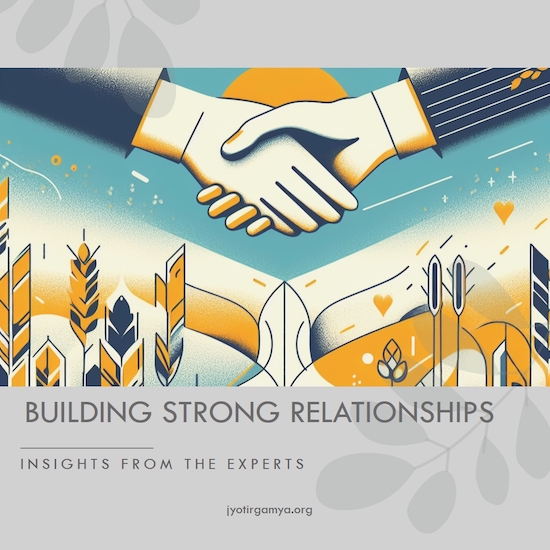Building Strong Relationships: Insights from the Experts
Story : Shedding the Scorpion Queen’s Crown
Jack, a gentle soul with a poet’s heart admired Pamela’s intellect, and was drawn to her fiery energy. One day, he shared a heartfelt piece about his favourite sports hero, hoping to connect.
Pamela, like a queen rejecting a peasant’s offering, scoffed, “Why are you always hero-worshiping these people? Also, you should stick to writing short pieces, as I do.”

Pamela Parker was a scorpion in the jungle, constantly stinging her way to the top. But it did not stop there. She continuously judged people, pointing out flaws and shortcomings as if she were perfect. She manipulated, deceived, and cheated through life, leaving a trail of fools in her wake. Her new crush Jack, was just another victim of her venom.
Her constant need to feel superior reflected her insecurities and self-doubt. She was always looking for ways to prove that she was better and brighter than others.
Jack, usually a picture of patience, faltered. “Your biting words may sing humility,” he said, his voice low, “but your actions scream otherwise.
Pamela, a record stuck on repeat, tried to dismiss him. “Don’t be so sensitive,” she sniped, “I was just joking.”
Frustrated with Pamela’s lack of self-awareness, Jack said, “Your judgemental nature and ego have ruined your past relationships.”
Pamela was a one-trick pony, and everyone around her was tired of her act.

Instead of arguing with her, he listened with a serene smile and gave her the impression that he was not interested in her nonsense. He eventually became immune to her charms. He packed his bags and left, leaving Pamela in a state of shock. He knew he would meet someone kinder one day.
She was like a fish out of water, flapping helplessly as she tried to lure the victim back. She threatened, pleaded, and tried all sorts of gimmicks, blind to the fact that she was making a fool of herself, and all the while, her hostage had fled.
Pamela talked to a wise old friend about her situation. She was going on and on about how smart she was and how she couldn’t believe that her con arts were withering away. Pamela finally asked, “Do you think I’m over?”
Her friend smiled and said, “Relationships are not about spelling your charms, but surrendering; it is not just about having the answers; it’s about knowing when to listen. If you don’t listen, you could win the battle but will lose the war.”
Pamela learned that sometimes, you must be the bigger person and put your ego aside. She realised that her could-be partner had been right to leave her and that she needed to change if she ever wanted to be truly happy.

That night, Pamela stared at her reflection, seeing not a sharp queen, but a lonely cactus. She learned the hardest lesson: true intelligence wasn’t in belittling, but in empathy, vulnerability, and open-mindedness.
The journey wouldn’t be easy. She had to shed her prickly armor, cultivate compassion, and learn the art of listening.

Introduction
Building strong, lasting relationships can be both rewarding and challenging.
This article delves into the secrets of success, drawing insights from renowned experts in the field. Communication, self-care, and even spirituality emerge as key pillars of healthy connections.

Whether you’re looking to enhance existing relationships or cultivate new ones, this guide offers practical wisdom to navigate the sometimes-turbulent waters of human connection.
Ready to build stronger bonds? Dive in and discover the magic of meaningful relationships.
Expert Opinions
“One must accept people as they are without being judgmental about them. One must not try to change someone according to their perceptions.
Acceptance is a fundamental aspect of healthy relationships. When we judge others based on our biases and perspectives, we hurt their feelings and damage the trust and respect that form the foundation of any meaningful connection. Accepting people as they are shows them they are valued and appreciated for who they indeed are, which can help build more robust and more authentic relationships.
Moreover, trying to change someone is often an exercise in futility, as people are typically resistant to being molded into someone else’s idea of who they should be. This can lead to frustration, disappointment, and resentment, further damaging the relationship. Instead, it is better to engage in open, honest communication, actively listen to each other, and work together to find common ground and grow together, rather than trying to force someone to change.”
“Do let your partner know your feelings. Do not expect your partner to be someone they are not.
It’s important to communicate openly and honestly with your partner about your feelings, but it’s equally important not to impose unrealistic expectations on them. Everyone has unique qualities and personality traits that make them who they are, and it’s unfair to try to change someone into someone they’re not. Expecting your partner to be someone they’re not will only lead to disappointment and frustration for you. Instead, it’s important to acknowledge and appreciate your partner’s individuality and work together to find ways to strengthen your relationship based on mutual understanding and respect.”
“It’s true that many relationship challenges can be repaired with effort and understanding. Of course, great relationships require effort and negotiation from both partners, but even if only one person is willing to work on the relationship, positive changes can still be made. The key to successful negotiation in a connection is open and honest communication and a willingness to compromise and find common ground.
In addition, it’s important to acknowledge that the foundation of any relationship starts with one’s relationship with oneself. Therefore, taking care of oneself and having a healthy relationship with oneself can help lay the foundation for healthy relationships with others.
Lastly, a spiritual discipline can complement and support a relationship, helping to deepen the connection and release love in its purest form. Through meditation, prayer, or other spiritual practices, incorporating spirituality into a relationship can bring both partners a greater sense of peace and fulfilment.”
“Relationships play a crucial role in our lives, and their quality dramatically impacts our overall well-being. Different types of relationships have unique needs that can be physical, psychological, emotional, social or financial. One’s perspective defines relationships, and personal views can vary. Relationships are not always easy, but two people can weather any storm together if they share mutual trust, commitment, understanding, acceptance, and compatibility. Communication is also a vital component of a successful relationship. Maintaining balance and equality in a relationship is essential to keep it afloat.
Emotional, romantic, and physical connections with others can be exhilarating, but it takes effort to maintain a healthy relationship. Relationships require effort to find the missing pieces and complete the puzzle. A strong foundation of five key elements is necessary for a healthy relationship to thrive.
-
Pillar 1 Respect : Do I feel respected for who I am in this relationship?
-
Pillar 2 Trust : Do I feel psychologically safe with this person? It is like an eraser. It gets smaller and smaller after every mistake.
-
Pillar 3 Affection : Do I get positive emotional vibes from this person? Sense of appreciation.
-
Pillar 4 Less Expectation : Do I expect more? Be aware of unspoken expectations. When you stop expecting people to be perfect, you can like them for who they are.
-
Pillar 5 Communication : Am I able to communicate my feelings? -Honest and transparent communication. Don’t give up at first signs of friction; only clear communication, flexibility and willingness to adapt will weather the storm of life.
One needs to ask himself which one needs a tile for me. What are you craving in a relationship? Identify toxic factors. Nurture it, and learn to accept and manage it if you cannot change it. One needs to develop healthy habits to build a strong relationship. Habit is a repeated unconscious pattern of thinking.
-
Habit 1 : Give up the addiction to be correct (Understand at what cost)
-
Habit 2 : Listen with an open heart (Do not listen to plan your opinion)
-
Habit 3 : Invest in Emotional Bank Balance (Deposit more means expressing appreciation, prioritizing and holding space)
-
Habit 4 : Forget and forgive (Start fresh, unplug yourself, learn to let go. When you are willing to understand mistakes and forgive each other.)
Respect yourself first. Then only you will be able to respect others. Instead of comparing, try to travel your journey. Just look at your destination. Being good to yourself equates to having a positive relationship with yourself. Great relationships don’t just fall into our laps. They require people to move through their fears and insecurities and do the hard work to move wounds into healing. Happiness increases the more you give it away.
The key to happiness is simple: make somebody else happy, and happiness will find you. Every relationship is unique, and people come together for many different reasons. Part of defining a healthy relationship is sharing a common goal for precisely what you want the relationship to be and where you want it to go by maintaining a meaningful emotional connection.”
“Effective communication is vital in any relationship. It is essential to provide each other with an open and safe space to express feelings and actively listen to one another. This helps to foster a deeper understanding and connection between partners.
Lying can be highly damaging to relationships and creates scars of mistrust that can take a long time to heal. Trust is crucial in any healthy relationship, and honesty is at the heart of building and maintaining that trust. Dishonesty erodes the foundation of the relationship and can make it difficult for partners to rebuild the lost trust. Therefore, maintaining honesty and transparency in all interactions is essential for the growth and longevity of a relationship.”
“It’s crucial to have open and honest communication in a relationship. This involves actively listening to each other, expressing one’s thoughts and feelings, and being willing to have difficult conversations when necessary. Setting clear boundaries and giving each additional space to pursue individual interests and hobbies help maintain a healthy relationship balance.
Recognising that each person brings unique experiences and perspectives to the relationship is essential. Expecting your partner to see things exactly as you do is unrealistic and can lead to disappointment and frustration. Instead, it’s better to appreciate and accept these differences, as they can add depth and richness to the relationship. By embracing each other’s individual perspectives and experiences, couples can grow and learn from one another.”
Conclusion
To develop strong and healthy relationships, it’s essential to start with a strong foundation of mutual respect, trust, affection, and effective communication. This can be achieved by cultivating healthy habits such as open-hearted listening, investing in emotional connections, and letting go of the need to be correct.
By prioritizing one’s self-care and having a healthy relationship with oneself, we can lay the foundation for positive and fulfilling relationships with others. Remember, building and maintaining excellent relationships takes effort and dedication, but the reward is well worth it.
Related Articles
How to Avoid Relationship Problems
Secrets to a Lasting Relationship
How to Avoid Relationship Problems in 2022
9 Relationship Management Advice from Experts”
If you like what we are doing, do spread the word.
Want to stay connected? Here’s our twitter.
Or subscribe to our monthly newsletter containing tools for body, mind, and goal.